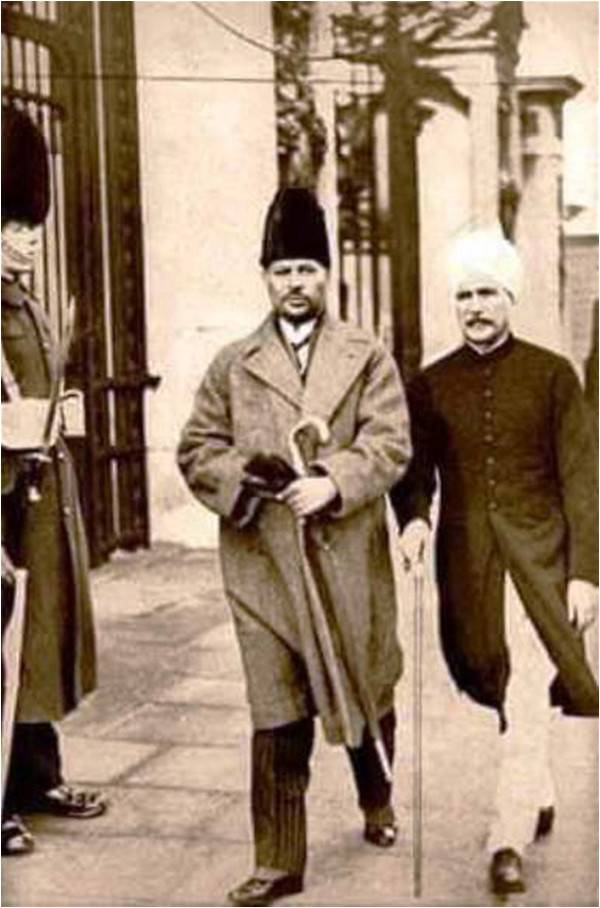
In this undated photograph, two prominent Pakistanis, Sir Muhammad Zafarullah Khan and Allama Iqbal, appear to be walking by Buckingham Palace in the 1930s when the Round Table conferences were being held to consider the future of the constitution of India.
Chaudhry Muhammad Zafarullah Khan was born in Sialkot on February 6, 1893. In a booklet that paid tribute to his mother, he mentions that they were the Sahi Jats of Daska. “There is a tradition that the Sahis at one time held sway over the region around Sahiwal. Our branch of the Sahi clan had been settled in Daska for a number of generations, so that our town had come to be known as Daska of the Sahis.”
His father, Nasrullah Khan, was born in 1863. He became a lawyer and went on to practice in Daska and later in Sialkot. While his father was still a student in Lahore, he married his cousin Husain Bibi, the eldest daughter of his younger maternal uncle, Chaudhri Ilahi Bakhsh of Data Zaidka.
Zafarullah’s father placed great stock in educating his son who went to Government College, Lahore and on to receive his LL.B. from King’s College London, in 1914. He practiced law in Sialkot and Lahore and became a member of the Punjab Legislative Council in 1926. He presided at the Delhi meeting of the All-India Muslim League in 1931, where he advocated the cause of the Indian Muslims. He participated in the Round Table Conferences held from 1930 to 1932.
He was knighted in 1935.
At the request of Muhammad Ali Jinnah, Sir Zafarullah represented the Muslim League in 1947 before the Radcliffe Boundary Commission and presented the case of the Muslims. When the new country was formed, in 1947, he was made its first Foreign Minister and he concurrently served as leader of Pakistan’s delegation to the UN (1947–54).
In 1953 riots erupted in the Punjab, over a demand that the A?madiyyah be declared non-Muslim and that all members holding public office be dismissed. Details are recorded in the Munir Commission Report. Given the pressure, Sir Zafarullah, who was known as a prominent Ahmadi, resigned as foreign minister in 1954.
When he represented Pakistan at the United Nations Security Council he advocated the liberation of occupied Kashmir, Libya, Northern Ireland, Eritrea, Somalia, Sudan, Tunisia, Morocco, and Indonesia. He also championed the cause of Palestine. In 1953, the King of Jordan, His Majesty the late King Hussein bin Talal, awarded him the highest honour of the kingdom. In 1954, he became a judge at the International Court of Justice in The Hague, a position he held until 1961. From 1962 to 1964, he was also the President of the UN General Assembly. He is the only Pakistani to have served as the president of the International Court of Justice, which he did from 1970 to 1973.
He died in Lahore at the age of 92 on September 1, 1985.
Chaudhry Muhammad Zafarullah Khan was born in Sialkot on February 6, 1893. In a booklet that paid tribute to his mother, he mentions that they were the Sahi Jats of Daska. “There is a tradition that the Sahis at one time held sway over the region around Sahiwal. Our branch of the Sahi clan had been settled in Daska for a number of generations, so that our town had come to be known as Daska of the Sahis.”
His father, Nasrullah Khan, was born in 1863. He became a lawyer and went on to practice in Daska and later in Sialkot. While his father was still a student in Lahore, he married his cousin Husain Bibi, the eldest daughter of his younger maternal uncle, Chaudhri Ilahi Bakhsh of Data Zaidka.
Zafarullah’s father placed great stock in educating his son who went to Government College, Lahore and on to receive his LL.B. from King’s College London, in 1914. He practiced law in Sialkot and Lahore and became a member of the Punjab Legislative Council in 1926. He presided at the Delhi meeting of the All-India Muslim League in 1931, where he advocated the cause of the Indian Muslims. He participated in the Round Table Conferences held from 1930 to 1932.
He was knighted in 1935.
At the request of Muhammad Ali Jinnah, Sir Zafarullah represented the Muslim League in 1947 before the Radcliffe Boundary Commission and presented the case of the Muslims. When the new country was formed, in 1947, he was made its first Foreign Minister and he concurrently served as leader of Pakistan’s delegation to the UN (1947–54).
In 1953 riots erupted in the Punjab, over a demand that the A?madiyyah be declared non-Muslim and that all members holding public office be dismissed. Details are recorded in the Munir Commission Report. Given the pressure, Sir Zafarullah, who was known as a prominent Ahmadi, resigned as foreign minister in 1954.
When he represented Pakistan at the United Nations Security Council he advocated the liberation of occupied Kashmir, Libya, Northern Ireland, Eritrea, Somalia, Sudan, Tunisia, Morocco, and Indonesia. He also championed the cause of Palestine. In 1953, the King of Jordan, His Majesty the late King Hussein bin Talal, awarded him the highest honour of the kingdom. In 1954, he became a judge at the International Court of Justice in The Hague, a position he held until 1961. From 1962 to 1964, he was also the President of the UN General Assembly. He is the only Pakistani to have served as the president of the International Court of Justice, which he did from 1970 to 1973.
He died in Lahore at the age of 92 on September 1, 1985.

